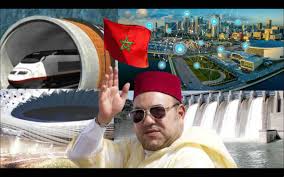
Moroccans of all walks of life as well as all foreign visitors are impressed by the remarkable progress achieved by the country under the wise leadership of King Mohammed VI in all sectors including industry,green energy,healthcare,social protection…
On this July 30,2025,Morocco celebrates the twenty-sixth anniversary of King Mohammed VI’s ascension to the throne. It’s a day of national unity and reflection on the achievements accomplished thanks to the farsighted royal guidance leading to successful economic,political and institutional reforms,making the country an inspirational model for others to follow.
Morocco’s GDP jumped from $46 billion in 1999 to $150 billion in 2024 driven by 4 pc annual growth rate over the past 2000-2023 period and diversification of the economy which has shifted focus from agriculture to manufacturing and service while keeping inflation under control.
At the international level,Morocco has strengthened its trade integration by signing more than 50 Free Trade Agreements (FTA) with about 70 countries,including the European Union,the United States,Turkey and many African countries.
Since 1999,Morocco’s infrastructure witnessed a major transformation and expansion. The motorway network increased from 400 km to more than 1,830 km currently,connecting main cities such as Casablanca,Rabat,Fez,Oujda,Tangier,Meknès,Marrakech,and Agadir.
Morocco’s high-speed train,launched in 2018,has revolutionized transport between Tangier and Casablanca,reducing travel time and transporting more than 5 million passengers each year. The number of the airports has also increased considerably,with 17 international airports,including those of Casablanca,Agadir,and Dakhla,welcoming more than 25 million passengers each year.
The Tanger Med port,inaugurated in 2007,has exceeded its 9 million TEU (Twenty-foot Equivalent Unit) capacity,handling 10,241,392 TEUs in 2024. This significant achievement positions the port as a major player in global container traffic.
Furthermore,the living conditions have improved significantly in Morocco particularly in the rural zones wherein every Moroccan has now access to electricity and drinking water,up from less than half in 2000.
Several economic and development projects,as well as social programs were launched to enhance social cohesion,expand citizens’ access to basic services,and reduce social gaps and discrepancies.
Thanks to the royal vision,Morocco has now become an African leader in energy transition with the deployment of solar,wind,and hydroelectric power plants,now representing nearly 45% of the national electricity mix. The Kingdom’s goal is to have 52% of its electricity generated from renewable sources by the year 2030.
To ensure steady water supply and mitigate the impact of drought on farming,Morocco is investing nearly $40 billion in the construction of dams,desalination plants,and waterways projects.
Thanks to its political stability,open economy and tolerance,the North African Kingdom is attracting a growing number of foreign tourists and investors to its competitive automotive and aeronautics eco-systems,making of the country a global export hub.
The Royal diplomatic initiatives have established the Kingdom as a bridge between Africa,Europe,and the Arab world,fostering dialogue between civilizations and religions. The country is commended for its role in promoting peace and stability,including its involvement in international peacekeeping efforts and conflict resolution.
The royal multifaceted diplomacy is building bridges between states,regional groups,and religions. It advocates peace,intercultural and interfaith dialogue,and coexistence among peoples,while countering extremism,racism,and hate speech.
The royal diplomacy also focuses on European neighbourliness and solidarity-based south-south cooperation. King Mohammed VI has travelled extensively to Africa,making 50 visits and opening up the markets of numerous African countries to Morocco’s private sector and businesses across various fields.
For 26 years,the diplomacy of the King has based on foundational principles that underpin its strength and uniqueness: the sacredness of the national cause,independent decision-making,a clear vision of global challenges,transparency with bilateral and international partners,and the courage to stand firm without compromise or complacency regarding the Sahara issue.
In his Green March speech of 2024,King Mohammed VI had affirmed that Morocco’s partnerships and legal obligations will never be at the expense of its territorial integrity or its national sovereignty.
The Monarch had also praised growing international recognition of the Sahara as a Moroccan territory,and the broad support the Autonomy Initiative has been receiving.
According to analysts,2025 will be the year of the closure of the Sahara issue in favor of Morocco as the Trump administration,France,Spain,and UK are pushing for the final resolution of the Sahara regional conflict on the basis the autonomy plan offered by Morocco under its sovereignty as the ONLY realistic solution to this issue.
United News - unews.co.za